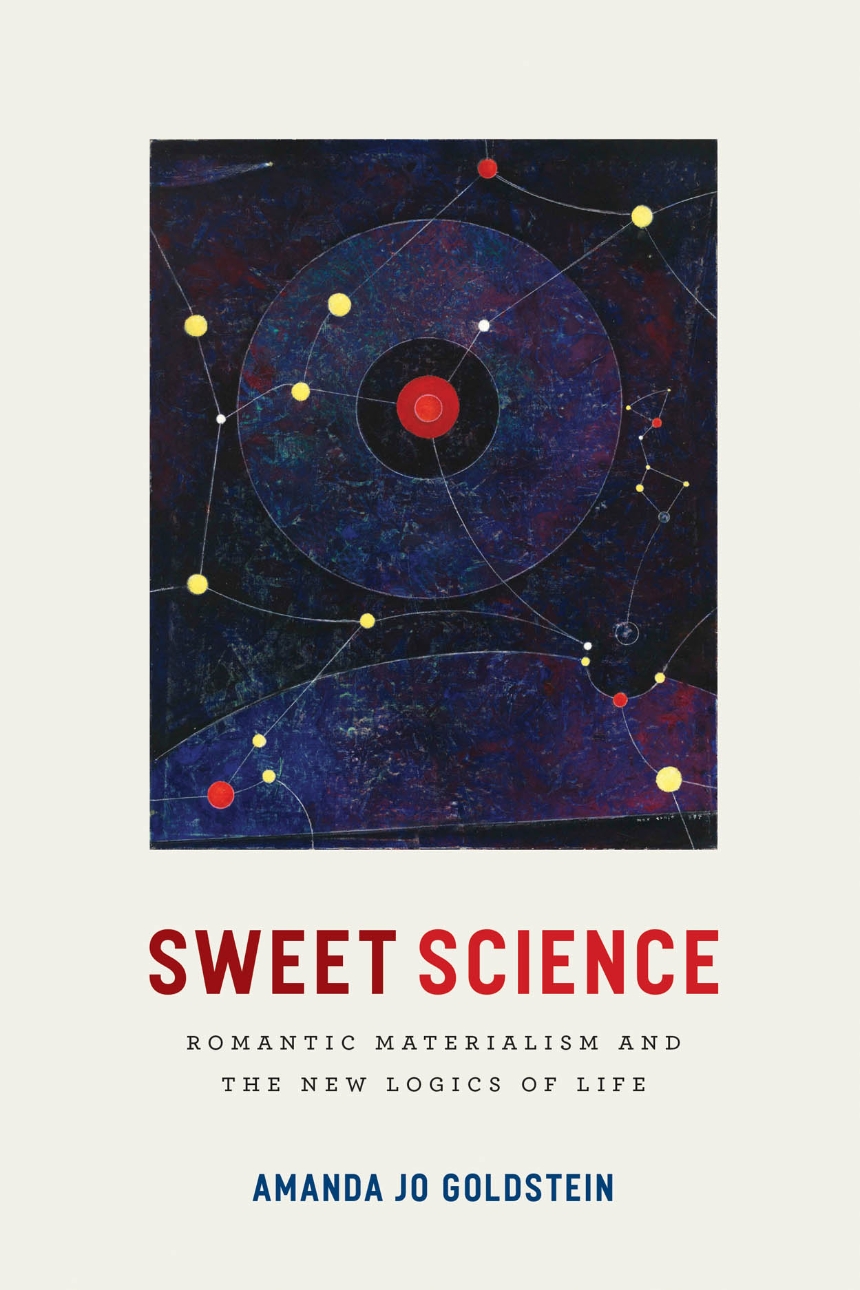Sweet Science
Romantic Materialism and the New Logics of Life
9780226484709
9780226458441
9780226458588
Sweet Science
Romantic Materialism and the New Logics of Life
Today we do not expect poems to carry scientifically valid information. But it was not always so. In Sweet Science, Amanda Jo Goldstein returns to the beginnings of the division of labor between literature and science to recover a tradition of Romantic life writing for which poetry was a privileged technique of empirical inquiry.
Goldstein puts apparently literary projects, such as William Blake’s poetry of embryogenesis, Goethe’s journals On Morphology, and Percy Shelley’s “poetry of life,” back into conversation with the openly poetic life sciences of Erasmus Darwin, J. G. Herder, Jean-Baptiste Lamarck, and Étienne Geoffroy Saint-Hilaire. Such poetic sciences, Goldstein argues, share in reviving Lucretius’s De rerum natura to advance a view of biological life as neither self-organized nor autonomous, but rather dependent on the collaborative and symbolic processes that give it viable and recognizable form. They summon De rerum natura for a logic of life resistant to the vitalist stress on self-authorizing power and to make a monumental case for poetry’s role in the perception and communication of empirical realities. The first dedicated study of this mortal and materialist dimension of Romantic biopoetics, Sweet Science opens a through-line between Enlightenment materialisms of nature and Marx’s coming historical materialism.
Goldstein puts apparently literary projects, such as William Blake’s poetry of embryogenesis, Goethe’s journals On Morphology, and Percy Shelley’s “poetry of life,” back into conversation with the openly poetic life sciences of Erasmus Darwin, J. G. Herder, Jean-Baptiste Lamarck, and Étienne Geoffroy Saint-Hilaire. Such poetic sciences, Goldstein argues, share in reviving Lucretius’s De rerum natura to advance a view of biological life as neither self-organized nor autonomous, but rather dependent on the collaborative and symbolic processes that give it viable and recognizable form. They summon De rerum natura for a logic of life resistant to the vitalist stress on self-authorizing power and to make a monumental case for poetry’s role in the perception and communication of empirical realities. The first dedicated study of this mortal and materialist dimension of Romantic biopoetics, Sweet Science opens a through-line between Enlightenment materialisms of nature and Marx’s coming historical materialism.
336 pages | 6 halftones | 6 x 9 | © 2017
Literature and Literary Criticism: British and Irish Literature
Reviews
Table of Contents
Introduction: “Sweet Science”
a. Tingeing the Cup with Sweet
b. Undisciplined Romantics
c. The “Poetry of Life”
d. Matter Figures Back
e. Chapters and Scope
Chapter 1. Blake’s Mundane Egg: Epigenesis and Milieux
a. Into the Egg
b. The Missing Baumeister
c. From Epi- to Autogenesis
d. Epigenesis and Milieux
e. Beholding
f. Epigenesis, an Epilogue
Chapter 2. Equivocal Life: Goethe’s Journals on Morphology
1. Goethe and the Equivocal Matter of De rerum natura
a. Endlessly Small Points, 1785–86
b. Life Is Not a Power
c. Equivocity
2. Obsolescent Life
d. Going to Dust, Vapor, Droplets
e. Trying Not to Think about Sex
f. Natural Simulacrum
g. Writing Decadent Life
Chapter 3. Tender Semiosis: Reading Goethe with Lucretius and Paul de Man
1. Phenomenality and Materiality in Goethe and Lucretius
a. The Skins or Signs of Things
b. Another “Rhetoric of Temporality”
c. Atoms, Letters, Figures
2. Tender Empiricism
d. Kant’s Immodesty
e. Active like an Object
Chapter 4. Growing Old Together: Lucretian Materialism in Shelley’s The Triumph of Life
a. Prologue: Montaigne’s Face
b. Morphology and Shelley’s “Shapes”
c. Shelley, Wrinkled
d. Life, Triumphant
e. A Thousand Unimagined Shapes
f. What Shares the Air
g. Atmospheres of Sensation
h. Historical Material
Chapter 5. A Natural History of Violence: Allegory and Atomism in Shelley’s The Mask of Anarchy
a. “The Occasion of the Massacre at Manchester”
b. Ghastly Masquerade
c. Events Take Shape
d. Material Poetic Justice
e. Atomic Prehistories for The Mask of Anarchy
f. Getting Didactic
g. As Nature Teaches
h. Pedagogy of Knowledge-Power
i. The Power of Assembly
Coda: Old Materialism, or Romantic Marx
Acknowledgments
Notes
Bibliography
Index
a. Tingeing the Cup with Sweet
b. Undisciplined Romantics
c. The “Poetry of Life”
d. Matter Figures Back
e. Chapters and Scope
Chapter 1. Blake’s Mundane Egg: Epigenesis and Milieux
a. Into the Egg
b. The Missing Baumeister
c. From Epi- to Autogenesis
d. Epigenesis and Milieux
e. Beholding
f. Epigenesis, an Epilogue
Chapter 2. Equivocal Life: Goethe’s Journals on Morphology
1. Goethe and the Equivocal Matter of De rerum natura
a. Endlessly Small Points, 1785–86
b. Life Is Not a Power
c. Equivocity
2. Obsolescent Life
d. Going to Dust, Vapor, Droplets
e. Trying Not to Think about Sex
f. Natural Simulacrum
g. Writing Decadent Life
Chapter 3. Tender Semiosis: Reading Goethe with Lucretius and Paul de Man
1. Phenomenality and Materiality in Goethe and Lucretius
a. The Skins or Signs of Things
b. Another “Rhetoric of Temporality”
c. Atoms, Letters, Figures
2. Tender Empiricism
d. Kant’s Immodesty
e. Active like an Object
Chapter 4. Growing Old Together: Lucretian Materialism in Shelley’s The Triumph of Life
a. Prologue: Montaigne’s Face
b. Morphology and Shelley’s “Shapes”
c. Shelley, Wrinkled
d. Life, Triumphant
e. A Thousand Unimagined Shapes
f. What Shares the Air
g. Atmospheres of Sensation
h. Historical Material
Chapter 5. A Natural History of Violence: Allegory and Atomism in Shelley’s The Mask of Anarchy
a. “The Occasion of the Massacre at Manchester”
b. Ghastly Masquerade
c. Events Take Shape
d. Material Poetic Justice
e. Atomic Prehistories for The Mask of Anarchy
f. Getting Didactic
g. As Nature Teaches
h. Pedagogy of Knowledge-Power
i. The Power of Assembly
Coda: Old Materialism, or Romantic Marx
Acknowledgments
Notes
Bibliography
Index
Awards
Modern Language Association: MLA Prize for a First Book
Won
American Society for Eighteenth-Century Studies: Oscar Kenshur Book Prize
Won
